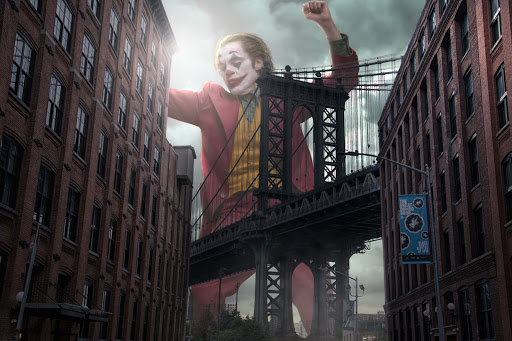La-La Land: The happiness of dreamers left unfinished.
Ha-Ha Land: The confessions of dreamers left unfinished.
Everyone has dreams, but when they choose to live only in reality, they let those dreams slip away.
To me, the Joker is a fascinating villain because his evil teeters between torment and pride, brilliance and delusion. He’s a pained antagonist steeped in pity, unlike Batman, the steadfast hero cloaked in solitude.
Before Joker, There Was Arthur
Before diving into “Joker,” we need to talk about “Arthur.”
Arthur is the name of a downtrodden clown clutching a dream of becoming a comedian, beaten down on the roadside by a gang of thugs. The way he curls up shows a frail body well-acquainted with such moments. He takes unprovoked beatings just to get them over with—much like enduring his uncontrollable fits of laughter to seem normal.
He wants to blend in, to avoid being seen as odd. But this man is anything but ordinary. He knows it all too well. So he carries a card detailing his condition, ready to fumble it out during a laughing fit to beg for understanding. That illness could earn him endless sympathy—if he’s quick enough and the other person doesn’t walk away first. Arthur also keeps a chaotic notebook, a jumble of thoughts like a fleeting memory. In his clearest moments, he scribbles down his mind to remind himself to live as others expect.
Dreams as a Balm
Arthur knows how to heal himself through daydreams. He imagines appearing on his favorite TV show, basking in applause, gaining recognition, and—most importantly—being called “son” by the host. Speaking of “son,” that brings us to “father.” Who’s Arthur’s dad? No one knows for sure—not his mother, who calls him “Happy,” not his therapist, not even the clerk managing orphanage records. And who cares? To his mom, he’s Happy; to the doctor, a patient; to the clerk, a file. To most of Gotham’s residents, Arthur? No one gives a damn about the man behind that name. He could vanish from society anytime he pleased—like dying, for instance. And if he didn’t, someone would do it for him.
A coworker hands him a gun for self-defense, with chivalrous words that soon shove him into unemployment.
“You’ve been working this long and still trust people, you dope? Honestly, I don’t even hate you—it’s just about survival, right?”
His therapist, with weary resignation, tells him free meds and sessions are over.
“Yeah, I can’t help you, so figure it out yourself, okay? Look at me—who’s helping me?”
His dream of being a comedian? It half-comes true, but not as he’d hoped. His stand-up debut draws laughs—mocking ones—at his uncontrollable giggles. The host he admires airs the clip for cheap entertainment.
“Come on, Arthur, I’ve got a life, a career to think about. That little clip didn’t hurt anyone—besides, you did look ridiculous! (laughs)”
Back home, his only kin—his odd mother—asks him to check the mail in a frail voice.
“H-h-appy, my H-ha-ppy, are you ‘happy’? Oh, and…”
And the girl? A few times, he dreams of her in a cozy theater, watching him shine as a comedian with a contented smile. After the show, they stroll the streets like any couple, arm in arm, chatting softly, then duck into a simple diner for dinner. In his darkest days, as his mother lies ill, she stays by his side, whispering sweetly, “I’ll grab some coffee—want some?”
The Breaking Point
Arthur could’ve lived out his days in unfulfilled fantasies if not for that late-night train ride when his laughing fit flares up. He sees some “party gentlemen” harassing a woman.
Too bad—this time, his card with its apology can’t come out fast enough. The three slick guys taunt him into laughing (thinking it’s genuine), then pummel him (because he’s laughing). It’s a bleak scene: three well-dressed men beating a clown.
Those three men are fate’s injustices.
And the clown is fate’s mockery of those injustices.
…
Bang—one shot.
Bang… Bang—two more.
Bang.
The man who once vented his rage on harmless trash cans now turns on people he blames for his suffering. Shockingly, he pursues them with cold precision, firing deliberate, careful shots, again and again.
And that’s where it ends.
The gun he nearly used to end himself becomes a tool for murder.
Arthur doesn’t die. He lives and becomes Joker—an inevitable outcome.
“I want you all to suffer like I’m suffering.”
Now he’s his own “Happy,” twirling in half-real, half-dreamt dances. Stripped of humanity, he lives by an animal’s killing instinct. That’s why a clown can morph into a cunning assassin, striking with precision, no training required.
Day or night, dreams or not, family or none—it doesn’t matter. Joker crowns himself a devil.
A shattered heart can wreak havoc on others, no longer gentle, just icy claws. Later, in Batman: The Dark Knight, we see a Joker repeating crimes to prove his brutal philosophy right.
Joker revels in a dance of vengeance—that’s his “Ha-Ha Land.”
A Simple Fix, Unseen
This could’ve been avoided if someone cared for poor Arthur. But who? When most Gothamites believe they owe nothing to anyone else? That life’s just a neat split between Batman’s good and Joker’s evil?
I caught an early screening, late in the day, and it left me with plenty to chew on. I believe if we get the chance, we should listen and guide someone in need. People don’t like doing things for free and assume nothing is—they’d rather pay or be paid for happiness. That’s my take.
We sometimes feel guilty for not helping others, so we dodge listening to their troubles altogether.
Of course, this review is just my take too.















